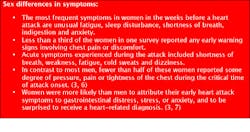February is American Heart Month: What's sex got to do with it?
Heart disease is the leading cause of death for men and women in the United States. Every year, 1 in 4 deaths is caused by heart disease. However, heart disease can often be prevented when people make healthy choices and manage their health conditions. Communities, health professionals, and families can work together to create opportunities for people to make healthier choices. Make a difference in your community: Spread the word about strategies for preventing heart disease and encourage people to live heart healthy lives. There are numerous ideas in an online toolkit that can use to spread the word about prevention of heart disease.(1)
When it comes to health, there are many crucial differences between men and women, heart and cardiovascular disease no exception. The Society for Women’s Health Research (SWHR) highlighted sex differences by initiating the 2001 Institute of Medicine report, Exploring the Biological Contribution to Human Health: Does Sex Matter? The report emphasized the importance of sex differences and suggested that these differences be translated into improved medical practice and therapies.
Regarding heart disease, it kills 500,000 American women each year, over 50,000 more women than men, and strikes women, on average, 10 years later than men. Women are more likely than men to have a second heart attack within a year of the first one.(2) Each year, approximately 40,000 more women than men suffer from a stroke. This is related to women’s greater life expectancy and the higher rates of stroke in the oldest age groups.(2) For a Fact Sheet on Sex Differences in Cardiovascular Disease, visit the SWHR website.(3)
One of our own, dental hygienist Norine Dowd, RDH, BHSc, shared her story about her own heart attack with Go Red. Visit the website to view the story or to contact Norine.(5)
“I am sure that because I was involved in 'Go Red' I knew that my symptom could be the sign of a heart attack. I want to make sure all women, and the people who love and care for them, know the warning signs of a heart attack. But most of all the simple life style changes that can prevent heart disease.” -- Norine Dowd











